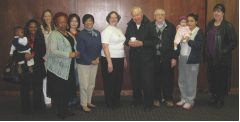

“It’s easy to do things in times of crisis. It’s harder to be there every day,” Kristina Scott told a crowd during Adult Education at Our Lady of Sorrows Church in Homewood on May 4. Scott, executive director of Alabama Possible, presented On Being a Good Neighbor: Poverty in Alabama. Alabama Possible is a nonprofit organization that educates, collaborates, and advocates reducing poverty in hopes of ending it. She said her goal at OLS was to give insight “on who our neighbors are and some of the needs and struggles that they might have, and some of the systemic barriers we have.”
Scott said Alabama is currently the seventh poorest state in the country, according to new census data, with about 900,000 people living below the federal poverty line. “In Alabama nearly as many white people are in poverty as African Americans,” she said. “If you look at the number of people, this is a Black and white problem, this isn’t urban or rural. It’s both.”
She explained situational poverty, caused by divorce or death, versus multi-generational poverty. “If you grew up as a low income child you are much more likely to be a low income adult,” she said. Showing a map of child poverty she said, “300,000 Alabama children live below the poverty line. They are challenged with food security so they might not have adequate nutrition which impacts their intellectual development. They are more likely to have underperforming schools which also impacts their employment options down the line and don’t have the quality of life and family structure….”
Scott said that according to polls, year after year, Alabama is one of the most religious states in the nation. “The Gallup organization consistently finds that Alabama is between the second and fourth most religious state in the country,” she said. “We’re also one of the most generous and charitable states in the country based on charitable deductions on our tax forms.”
She said it is a fundamental law in western and eastern religions to help one another.
“So, what does it mean to love thy neighbor as thyself,” she asked. She said that meeting immediate needs for low income children is important and making sure that they have food at school like breakfast and lunch can make a difference. She also cited child care challenges for mothers who need to work as being part of the problem. “What can you do to build relationships to help overcome the big challenges? Because people don’t move out of poverty in large groups, they move out one by one because of relationships,” she declared.
Scott observed that the Catholic Church through Catholic Charities and other agencies are on the front lines of helping neighbors: “I love coming to talk to y’all because you get it. So thank you. Not all of our brothers and sisters are as enlightened.” Scott said she believes if parishioners and others take their “philanthropy and advocacy and our volunteerism and we think about relationship-based work, which is hard, keep showing up at the same place, you will build relationships that we can achieve our potential, that every Alabamian can achieve their potential and that will also let us love our neighbors as ourselves.”



